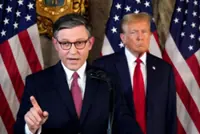WASHINGTON: Finance Minister Muhammad Aurangzeb has said Pakistan’s vast mineral resources could help fix the trade imbalance with the US, as both countries were set to hold trade talks next month.
Speaking at the Atlantic Council think tank in Washington, Aurangzeb downplayed the significance of new tariffs introduced by the Trump administration. He said the real issue was “trade imbalance “.





